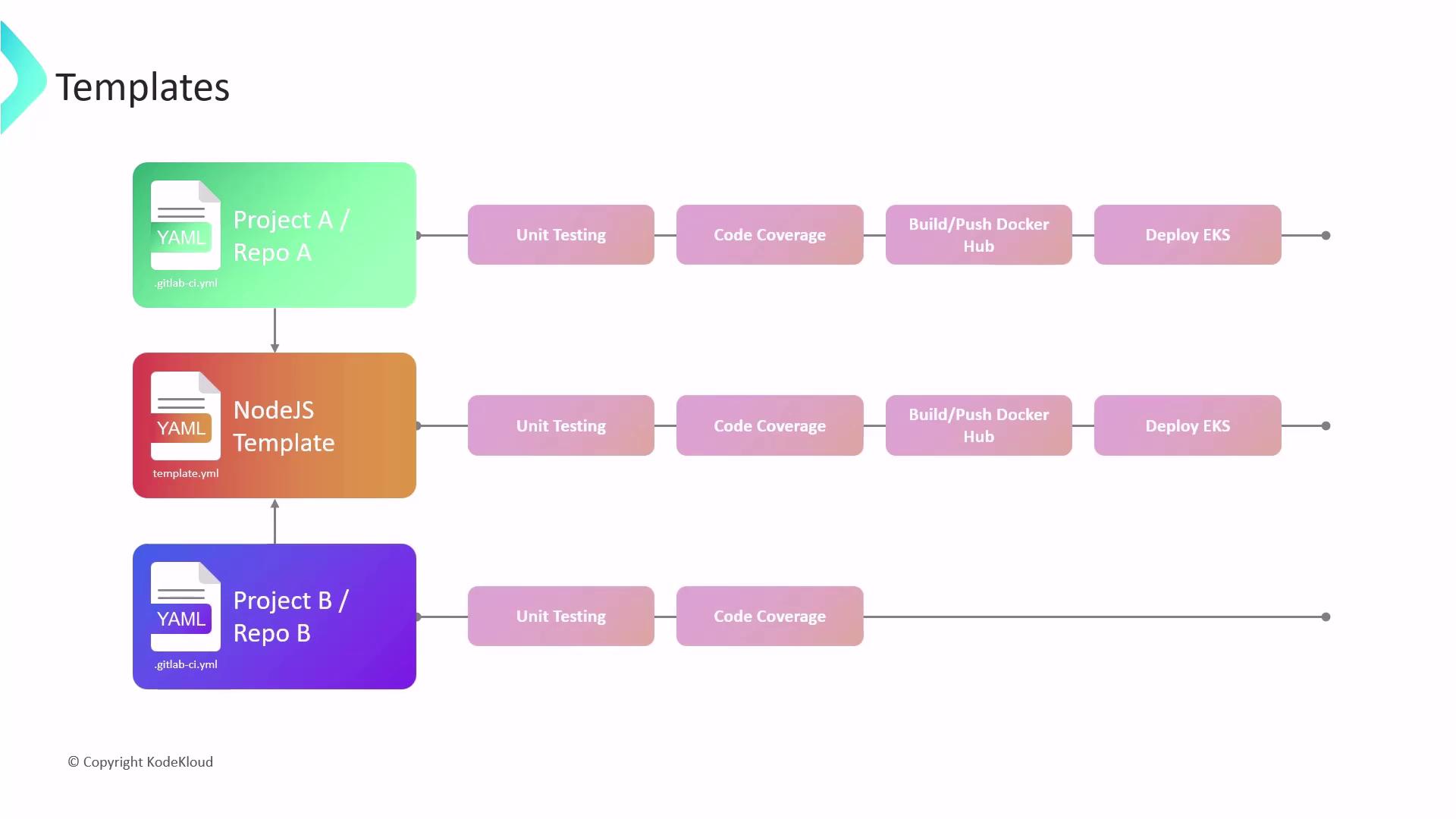GitLab CI/CD: Architecting, Deploying, and Optimizing Pipelines
Optimization Security and Monitoring
Template and Types of Includes
In this lesson, you’ll discover how to streamline your GitLab CI/CD pipelines using reusable templates and various include types. By the end, you’ll be able to eliminate repetitive YAML, enforce consistency across projects, and leverage GitLab’s built-in templates and external includes.
The Challenge of Repetitive CI YAML
When you define similar jobs (e.g., unit tests, code coverage) across multiple repositories, you often end up duplicating large blocks of configuration:
# .gitlab-ci.yml
unit_testing:
image: node:17-alpine3.14
services:
- name: siddharth67/mongo-db:non-prod
cache:
policy: pull-push
key:
files:
- package.json
paths:
- node_modules
before_script:
- npm install
script:
- npm test
code_coverage:
image: node:17-alpine3.14
services:
- name: siddharth67/mongo-db:non-prod
cache:
policy: pull-push
key:
files:
- package.json
paths:
- node_modules
before_script:
- npm install
script:
- npm run coverage
rules:
- if: '$CI_COMMIT_BRANCH == "main"'
when: manual
Maintaining these blocks manually is error-prone and time-consuming. Templates and includes help you define once and reuse everywhere.
GitLab CI/CD Templates
GitLab provides two primary template categories:
- Pipeline Templates
Full end-to-end CI/CD workflows for common project types (Node.js, Ruby on Rails, etc.). - Job Templates
Standalone jobs for tasks like security scans, linting, or Docker builds.
By including a template, you inherit predefined stages and jobs, then override or extend only what’s unique to your project.
Note
Built-in templates live in the gitlab-org/gitlab repository. You can also publish your own templates in a dedicated project.
Example: Reusing a Node.js Pipeline Template
Team A and Team B share a common Node.js template but customize deployment targets:
- Team A
- Registry: Docker Hub
- Deployment: AWS EKS
- Team B
- Registry: Google Container Registry
- Deployment: GKE
Both pipelines run the same stages—unit testing, code coverage, build & push, deploy—but inject different variables, credentials, and script overrides.

Key Takeaways
- Reusable templates accelerate onboarding and ensure best practices.
- Modular design lets teams opt into only the stages they require.
- Customization points (variables,
before_script,after_script) handle project-specific needs.
Types of Includes
GitLab CI/CD supports four include sources:
| Include Type | Description | YAML Example |
|---|---|---|
| local | Files in the same repo/branch | - local: 'jobs/.after-script.yml' |
| remote | YAML from an external URL | - remote: 'https://example.com/ci/.before-script.yml' |
| project | Files in another project on the same instance | - project: 'my-group/avengers-project'<br> ref: main<br> file: '/jobs/.gitlab-ci.yml' |
| template | GitLab’s built-in CI templates | - template: 'Code-Quality.gitlab-ci.yml' |
Warning
When using local includes, the default branch is HEAD. Specify ref if you need a different branch or tag.
Conditional Includes
You can apply includes only under specific conditions using rules:
include:
- template: 'Code-Quality.gitlab-ci.yml'
rules:
- if: '$CI_COMMIT_BRANCH =~ /^feature\//'
when: always
This ensures that the Code-Quality template is only included for feature branches.
References
Watch Video
Watch video content